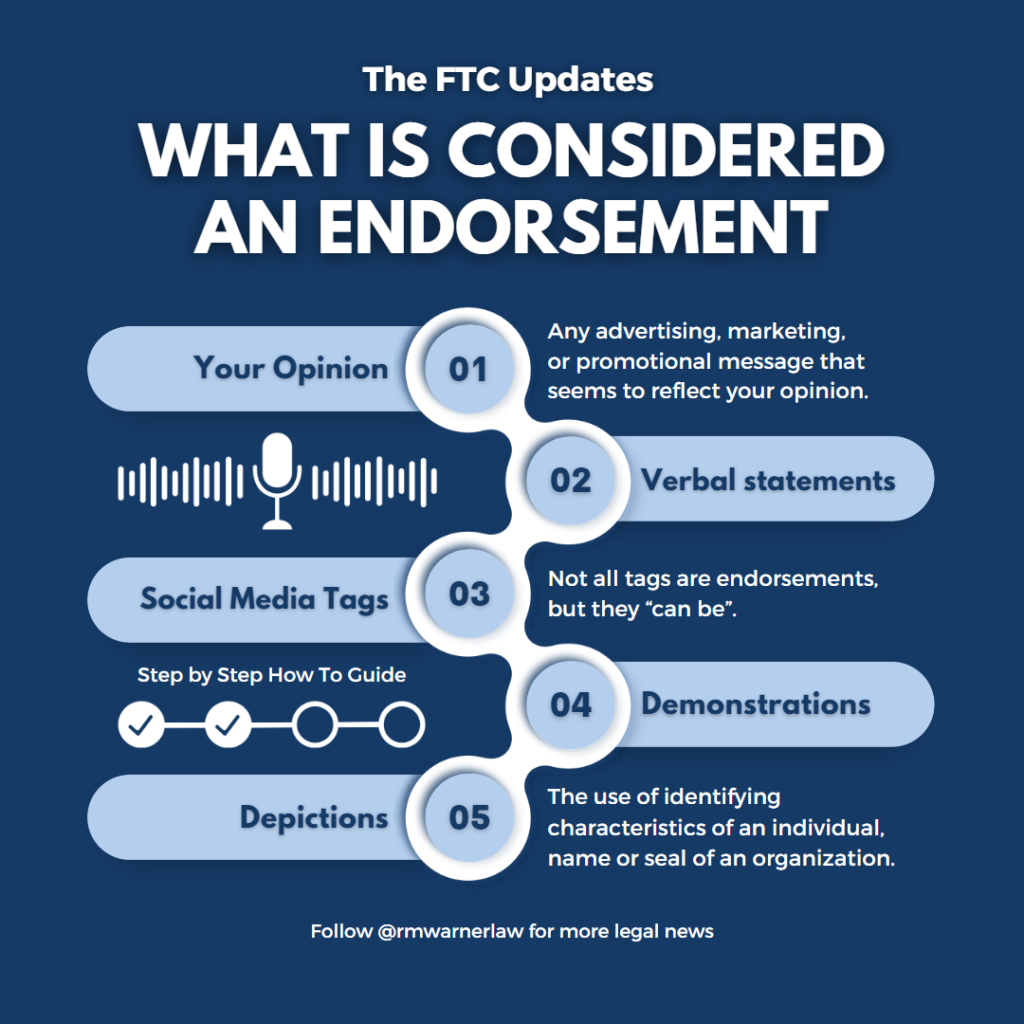FTC Legal Advertising Guidelines for Social Media Influencers
FTC Legal Advertising Guidelines for Social Media Influencers

Are you a social media influencer that promotes products? Do you own an e-commerce business that hires social media influencers to advertise on your behalf? If so, you need to be aware of Federal Trade Commission (FTC) advertising guidelines! The FTC is dedicated to “protecting the public from deceptive or unfair business practices and from unfair methods of competition through law enforcement, advocacy, research, and education.” Failure to comply with said guidelines can result in severe consequences and hefty fines, so entrepreneurs should refer back to the FTC’s Disclosures 101 For Social Media Influencers as often as possible.
Below, we’ll discuss how to make good disclosures – and when to make them- as we break down the FTC’s basic rules for social media influencer marketing.
FTC Influencer Advertising Tip #1: Make Material Connections Obvious
Honesty is the best policy when it comes to influencer marketing. When you are posting about a product in exchange for anything of value, it’s important to make it obvious. It may seem more authentic to your followers if you post without disclosing your material connections with the company, but it would also be deceptive. Deceptive marketing is exactly the kind of thing the FTC will hand out fines for, and you don’t want that. Nowadays, the average social media user already recognizes that accounts with over 10,000 followers are most likely being paid in some way to post about a brand, anyway.
Even without monetary payment, it’s still important to disclose any material connections. According to the FTC, a “material connection” also includes a personal, family, or employment relationship. Meaning, if you make a post describing how much you love the wine from “S Vineyards” (the company your sister works for) – it may be considered deceptive marketing to not disclose in your post that your sister works for the company.
FTC Influencer Advertising Tip #2: Get Familiar With Endorsement Guides
If you are an influencer agreeing to post about a product in exchange for compensation, it’s important to take responsibility and ensure your own compliance with FTC rules rather than just expecting the employing company to do so. In the end, the company may not end up being the one who the FTC fines- it might be you.
FTC Influencer Advertising Tip #3: Always Disclose And Never Assume
- You should disclose when you have employment, personal, financial, or family relationship with the brand.
- You should disclose when a brand gives you free products, discounts, samples or other perks. If you then post about their product, even if they don’t ask you to, you need to disclose how you obtained the product.
- You should disclose all the time, even if you think your followers are already aware of your paid partnerships. Everyday someone new could see your page so it’s important to ALWAYS disclose and NEVER assume.
- You should disclose even when you are posting outside the United States, because U.S. law will still apply, and foreign laws may too!
- The only time you don’t have to disclose about a brand relationship, or lack thereof, is if you post about a brand that you like but don’t have a relationship with. Meaning, you don’t have to tell your followers you have no brand relationship if you really do not. That being said, you also shouldn’t tell your followers you have a brand relationship if you actually do not.
FTC Influencer Advertising Tip #4: You Don’t Have to Get into Detail, but You Can’t Hide Your Disclosure
When disclosing your brand partnership, it’s not necessary for you to lay out all the details of your contract. Instead, just ensure your disclosure is easy to find and understand.
- Use language that is simple and clear.
- Don’t try and hide your disclosure in a group of hashtags within your post.
- Use terms like “advertisement”, “ad” and “sponsored”.
- Don’t use abbreviated language that is confusing or vague like “collab” or “spon”.
- Don’t use a different language for your disclosure than the language of your post.
- Use available disclosure tools when available on certain platforms in addition to your own disclosure.
FTC Influencer Advertising Tip #5: Don’t Lie or Fabricate Claims About A Product
It’s important that the opinions you tell your followers are true- especially when it comes to sponsored products. It’s not okay to tell people a terrible product was great just because you were paid by the company. In fact, that’s deceptive marketing, and you can be fined for it. It’s also not okay to talk about an experience with a product that you’ve never even tried. Remember, it’s important to the FTC, and your followers, that you’re honest about the products you’re promoting.
One Last Thing: Fake Followers
This last tip has less to do with paid posts, and more to do with how some influencers become sponsored. Buying fake followers to make your account seem like it has a large following is also not okay in the eyes of the FTC. In fact, buying or selling fake indicators of social media influence violates the FTC Act, as it is considered a deceptive practice. The Federal Trade Commission prosecutes businesses that buy or sell fake followers – and the same goes for fake reviews! In other words, if you lie in any way as a social media influencer, and the FTC finds out, you will be fined.
Ready to Speak With a Social Media Lawyer?
If you are a social media influencer or an online marketer dealing with FTC investigations or compliance issues, contact the social media law attorneys at RM Warner Law. We know how to help!
Similar like this
You also might be interested in
Understanding Anonymous Defamation: How It Happens Online
Anonymous defamation occurs when false statements are made about a [...]
Why Influencer Lawsuits Are on the Rise: And What It Means for the Industry
The influencer marketing industry has grown significantly over the past [...]
How to Remove Defamatory Content from the Internet: Legal Options Explained
In today’s digital world, defamatory content can spread quickly online, [...]
What’s the Difference Between Libel and Slander? A Legal Breakdown
A false statement can spread quickly and damage someone’s reputation, [...]






